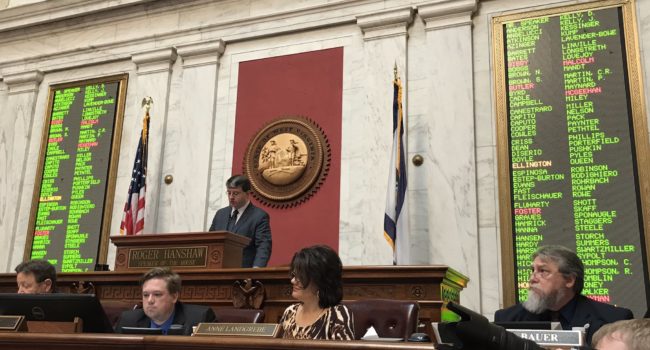CHARLESTON — The House of Delegates overwhelmingly passed a pay raise bill that includes teachers, school service workers and State Police.
The vote was 89 in favor, eight against with three delegates not voting. There was also a paired vote, which is parliamentary agreement to tie a no vote with a yes vote. The no vote was Delegate Tom Bibby, D-Berkeley, and the yes was Delegate Mike Caputo, D-Marion. Caputo was not present, but Bibby was.
“If we can’t pay our teachers a competitive rate, we’ll keep losing teachers to other states,” said Delegate Mark Dean, R-Mingo, vice chairman of the House Education Committee and principal of an elementary school in Gilbert.
This was a bill requested by the governor and promised during an announcement in the governor’s reception room back on Oct. 2. During that announcement, the governor was surrounded by other elected leaders, mostly members of the Republican majorities.
“We’re here because a couple of weeks before the general election the governor and other elected officials promised this pay raise,” said Delegate Mike Pushkin, D-Kanawha.
“This is about keeping promises. I wholeheartedly support this bill.”
But earlier in the legislative session, the pay raise was bundled with other provisions such as charter schools, education savings accounts, more county school board control over levy rates, a base of at least 1,400 students per county for funding purposes and more money for counselors and other health services.
Teachers unions objected to wrapping all those provisions together and finally went on strike for two days earlier this week until that version of the bill was killed in a House procedural vote.
The bill that includes just the pay raises now goes to the Senate, where its support is far less clear. The Republican majority in the Senate was intent on the other changes, and several of those senators say they have already voted for teacher pay raises in the bigger versions of the bill.
Speaking Friday morning on MetroNews’ “Talkline,” Senate Majority Leader Tom Takubo said teacher pay raises need to be brought up to be competitive with other states.
“I can’t speak for my entire caucus,” said Takubo, R-Kanawha. “A lot of people felt we absolutely supported not only a 5 percent pay raise but there was so much other good stuff to help not only with paid incentives to get specific needs taken care of in the state in that bill.
“And it was rejected, and we’ve had thousands of emails saying ‘Keep it; we don’t want it.’ That was not trying to keep a pay raise hostage. We 100 percent believe people needed that raise, but we needed a lot more. We had about $68 million more in public education we were trying to invest there.”




